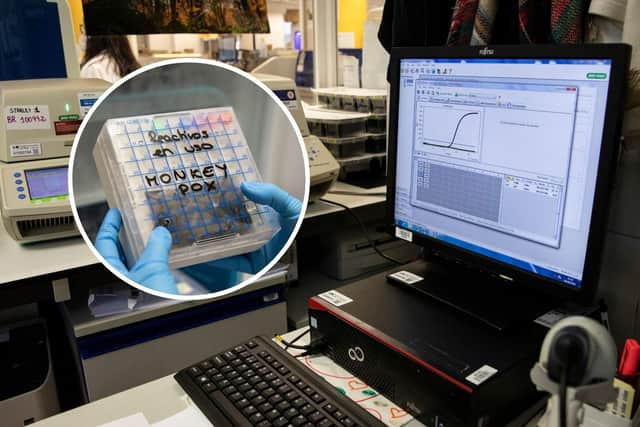Monkeypox Leeds: Confirmed cases in Yorkshire, signs and symptoms as UK records more than 1,000 infections
and live on Freeview channel 276
In its latest update, the UK Health Security Agency (UKHSA) said there were 1,076 confirmed cases in the UK as of June 26.
The number of cases had risen by 166 - or 15 per cent - compared to the previous report.
Yorkshire and regional data


Advertisement
Hide AdAdvertisement
Hide AdRegionally, the data showed there were 13 confirmed cases in Yorkshire and the Humber.
This had fallen by two cases compared to the previous week.
London had the biggest number of cases with 659, the UKHSA said.
There were 34 cases in the North West, 7 in the North East, 56 in the South East, 11 in the South West, 13 in the West Midlands, 11 in East Midlands and 29 in the East of England.
Comment
The UKHSA report said: "A high proportion of England cases were known to be London residents (79%, 659 of 833 with reported home address).
Advertisement
Hide AdAdvertisement
Hide Ad"For confirmed cases in the UK, where gender information was available, 1033 (100%) confirmed cases were male, with 5 confirmed female cases.
"The median age of confirmed cases in the UK was 36 years (interquartile range 31 to 43)."
What is Monkeypox?
Monkeypox is a rare viral infection that does not spread easily between people.
It is usually a mild illness that most people recover from within a few weeks. However, severe illness can occur in some individuals.
What are the symptoms?
Advertisement
Hide AdAdvertisement
Hide AdInitial symptoms include fever, headache, muscle aches, backache, swollen lymph nodes, chills and exhaustion.
A rash can develop, often beginning on the face, then spreading to other parts of the body.
The rash changes and goes through different stages before finally forming a scab, which later falls off.
NHS advice
Speaking about Monkeypox in the UK, the NHS website said: "Although more people have been diagnosed with it recently, only a small number of people in the UK have had monkeypox and the risk remains low."
Advertisement
Hide AdAdvertisement
Hide AdIt added that people are "extremely unlikely to have monkeypox", if:
*You have not been in close contact (such as touching their skin or sharing bedding) with someone who has monkeypox or has monkeypox symptoms
*You have not recently travelled to west or central Africa
It added: "Anyone can get monkeypox.
"Currently most cases have been in men who are gay, bisexual or have sex with men, so it's particularly important to be aware of the symptoms if you're in these groups."
Is there a vaccine?
In an update on June 21, it was announced that tens of thousands of men are to be offered a vaccine in a bid to stem the monkeypox outbreak in the UK.
Advertisement
Hide AdAdvertisement
Hide AdThe UKHSA said that in a bid to control the outbreak, some gay and bisexual men at higher risk of exposure to monkeypox should be offered the smallpox vaccine Imvanex.
It said that the jab had been shown to be effective against monkeypox.
Its new strategy, endorsed by the Joint Committee on Vaccination and Immunisation (JCVI), suggests that eligibility would depend on a number of factors but a clinician may advise vaccination for someone who has a “recent history of multiple partners, participating in group sex, attending sex on premises venues or a proxy marker such as recent bacterial STI in the past year”.
Comment Guidelines
National World encourages reader discussion on our stories. User feedback, insights and back-and-forth exchanges add a rich layer of context to reporting. Please review our Community Guidelines before commenting.
